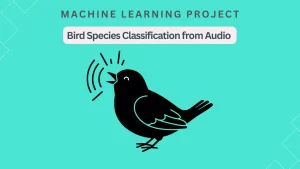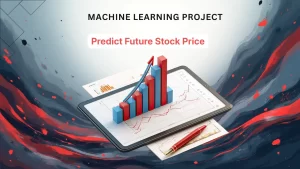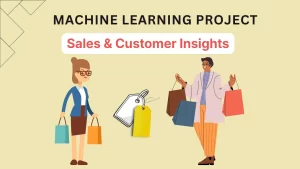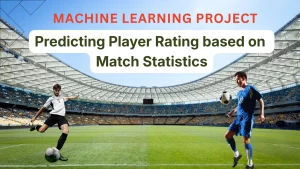Data Analytics Course Syllabus
Learn Advanced Data Analysis
Introduction to Python
- Introduction to python
- Environment setup & start programming
- Python Conditional Statements, Loops and File Handling
- Core Objects and Advanced Data Structures; Functions and Lambdas
- The Object Oriented Side of it
Introduction to Data Analysis with Python
- What is data analysis?
- Overview of Python and its data analysis libraries (NumPy, pandas, Matplotlib, Seaborn)
- Setting up your Python environment
Data Preprocessing and Cleaning
- Importing data from various sources (CSV, Excel, SQL)
- Exploring and understanding the dataset
- Handling missing data: imputation techniques
- Dealing with outliers and anomalies
- Data transformation: normalization, standardization
- Data integration and manipulation using pandas
Exploratory Data Analysis (EDA)
- Descriptive statistics: mean, median, mode, variance, etc.
- Histograms, box plots, scatter plots
- Correlation analysis and heatmaps
- Univariate and bivariate analysis
- Data visualization using Matplotlib and Seaborn
Data Visualization
- Advanced data visualization techniques: bar plots, line plots, pie charts, etc.
- Interactive visualizations using Plotly
- Geospatial visualization
- Effective data storytelling and communication
Statistical Analysis
- Sampling techniques and the Central Limit Theorem
- Hypothesis testing: t-tests, chi-square tests, ANOVA
- Confidence intervals and p-values
- Interpreting statistical results
Machine Learning Algorithms for Data Analysis
- Introduction to machine learning
- Feature engineering and selection
- Linear regression: simple and multiple regression
- Logistic regression for classification
- Decision trees and random forests
- Model evaluation metrics: R-squared, MAE, RMSE, accuracy, precision, recall, F1-score
- Model assumptions and diagnostics
Time Series Analysis
- Introduction to time series data
- Time series components: trend, seasonality, noise
- Decomposition techniques
- Time series forecasting methods: moving average, ARIMA,
exponential smoothing - Implementing time series analysis in Python
Advanced Topics
- Dimensionality reduction techniques (PCA, t-SNE)
- Clustering algorithms (K-means, hierarchical clustering)
- Advanced statistical techniques (non-parametric tests, ANCOVA)
Real-World Projects and Case Studies
- Applying data analysis concepts to real datasets
- Solving data analysis challenges and problems
- Creating a portfolio of data analysis projects
Projects Covered in Data Analytics Course
As part of the Data Analytics course, you will work on the projects listed below to gain hands-on, practical experience. In addition, if you have any other relevant project ideas aligned with industry requirements, those can also be included and covered during the course.
Meet Our Expert Data Analytics Trainer
Our Data Analytics trainer is an industry expert with 10 years of professional experience and currently works as a Data Scientist in a top MNC. With a passion for teaching, he has been training students in Data Analytics and Python for the past three years. His practical, project-based approach ensures learners gain real-world data analytics skills and hands-on exposure.
Our Data Analyst Course is designed to provide hands-on training with real-world projects, helping you gain job-ready skills in data analytics.
Top Features of Data Analyst Training in Pune.
Practical Learning Experience
Focus on hands-on exercises and live projects that help you apply concepts effectively in real-world business scenarios.
Master Industry Tools
Develop strong skills in Python, SQL, Power BI, Tableau, and other in-demand tools used by top data analysts today.
Resume & Placement Support
Get guidance to build a professional resume and benefit from our 100% placement assistance.
Interview Ready Training
Boost confidence with mock interviews and expert-led sessions designed to prepare you for job interviews.
FAQs to Help You Choose the Best Data Analytics Course in Pune
Why join a Data Analyst Course at Tech Concept Hub Pune?
A Data Analyst Course at Tech Concept Hub Pune helps you build job-ready skills in Python, SQL, Power BI, and data visualization. With growing demand for data professionals, it is one of the best career paths for freshers and professionals looking to upskill.
Are there job opportunities for freshers after completing a Data Analytics Course?
Yes, freshers can start as junior data analysts, business analysts, or reporting analysts. With practical training and placement support, you can build a strong career in the IT industry.
Are there job opportunities for freshers after completing a data analytics course?
Yes, there are plenty of job opportunities for freshers after completing a Data Analytics course! As data-driven decision-making becomes integral to organizations, the demand for skilled data analysts continues to grow across industries. Freshers can secure entry-level roles provided they showcase their skills, knowledge, and project experience.
Entry-Level Job Roles for Data Analytics Freshers:
Data Analyst
- Responsibilities: Data cleaning, analysis, visualization, and reporting.
- Tools: Excel, SQL, Tableau, Power BI, Python/R.
Business Analyst
- Responsibilities: Understanding business requirements, analyzing data to provide insights, and bridging the gap between business and technology teams.
- Skills: Communication, visualization, and basic analytics.
Junior Data Scientist
- Responsibilities: Performing predictive analysis, building simple machine learning models, and deriving actionable insights.
- Skills: Python/R, machine learning basics.
Data Visualization Specialist
- Responsibilities: Creating dashboards and reports to present data insights.
- Tools: Tableau, Power BI, Excel.
Operations Analyst
- Responsibilities: Analyzing operational data to improve processes and efficiency.
- Skills: SQL, data visualization, operational metrics.
Market Research Analyst
- Responsibilities: Studying market trends, customer behavior, and competitors to guide business strategies.
- Skills: Data analysis, survey tools, Excel.
Reporting Analyst
- Responsibilities: Generating and automating reports for stakeholders.
- Tools: SQL, Excel, Tableau/Power BI.
Data Quality Analyst
- Responsibilities: Ensuring data accuracy, consistency, and reliability.
- Tools: SQL, Python, and data auditing methods.
How much salary can I expect as a junior Data Analyst professional?
A fresher data analyst in India can expect a salary between ₹3 LPA to ₹5 LPA. With experience and advanced skills, salaries can grow significantly.
What is the difference between a Data Analyst and a Data Scientist?
A Data Analyst focuses on analyzing data and creating insights, while a Data Scientist uses advanced techniques like machine learning and AI for predictions. Both are rewarding careers, but analytics is the best entry point for freshers.
Do I need to have a strong mathematics background to become a Data Analyst?
No, you don’t need advanced math. Basic statistics and logical thinking are enough. Most of the work is done using tools like Python, SQL, and Power BI, which make data analysis easier.
What is the difference between a data analyst and data scientist?
A Data Analyst focuses on analyzing existing data to uncover trends, generate reports, and provide actionable insights for decision-making. Their primary goal is to interpret data and present findings through visualizations and summaries. They often work with tools like Excel, SQL, Tableau, or Power BI and apply statistical techniques to solve business problems.
A Data Scientist, on the other hand, works on more advanced and complex problems. They use data to build predictive models, design machine learning algorithms, and explore innovative ways to use data for decision-making. Data scientists often deal with unstructured data, write code in Python or R, and use techniques from mathematics, statistics, and computer science.
In short, a data analyst extracts and interprets insights from data, while a data scientist creates models and solutions to predict or automate processes using data. Both roles are essential, but data science usually requires more technical and programming skills.
How does Tech Concept Hub stand out for Data Analyst courses in Pune?
At Tech Concept Hub, we focus on delivering practical, job-oriented IT training that prepares students for real-world industry challenges. Our courses are designed with hands-on projects, updated tools, and expert mentorship to ensure you gain skills that companies actually demand. Along with technical knowledge, we emphasize practical learning so students build confidence to perform in their jobs from day one.
What sets us apart is our complete career support. We guide students with resume building, interview preparation, and mock interviews, along with 100% placement assistance. Rated 4.9/5 by 900+ learners, Tech Concept Hub is trusted as one of the best IT training institutes in Pune for courses like Data Analytics, Python, Power BI, AI, Cyber Security, Cloud, and more—helping students move ahead in their IT career with confidence.
Student Reviews for Data Analytics Course in Pune.
Frequently Asked Questions About IT Training at Tech Concept Hub
Why choose Tech Concept Hub for IT training in Pune?
At Tech Concept Hub, we focus on providing practical, job-oriented IT training. Our programs are designed to help students understand real-world business problems and build the skills required to solve them. With 4.9/5 ratings from 900+ students, we are among the top IT training institutes in Pune.
Do you provide 100% placement assistance after course completion?
Yes. We provide complete placement assistance through resume building, interview preparation, and mock interviews. Many of our students have secured jobs in top IT companies after completing training with us.
Are the trainers at Tech Concept Hub experienced IT professionals?
All our trainers are highly experienced IT professionals with 10+ years of expertise. They bring industry knowledge into the classroom, ensuring students gain practical skills along with conceptual understanding.
What makes Tech Concept Hub the best IT training institute in Pune?
Our uniqueness lies in the quality of training and mentorship. We don’t just teach; we guide students in career growth, provide one-to-one mentoring, and prepare them for industry challenges. This commitment differentiates us from other institutes.
Is training available in both online and classroom formats?
Yes. We offer flexible training options in both classroom and online modes. Students can choose the format that best suits their schedule and learning style.
How do students gain hands-on practical experience during training?
Every course at Tech Concept Hub is designed with live projects, case studies, and practical assignments. This approach ensures students gain real-world exposure, making them job-ready and confident for IT career opportunities.











